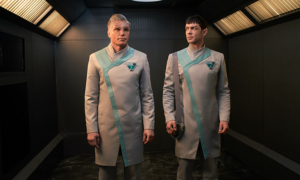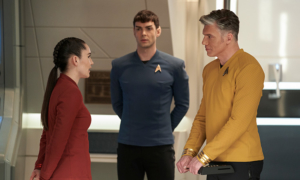Star Trek goes back to its origins with Star Trek: Strange New Worlds, a new adventure-of-the-week show set in the decade before the events of The Original Series. We speak to stars Anson Mount (Captain Pike) and Ethan Peck (a young Spock), who return to Starfleet following a successful arc on Discovery.
You both made your Star Trek debuts in Discovery. How does Strange New Worlds feel different to its predecessor?
Anson Mount: It was very important to me when Alex [Kurtzman, showrunner] and I started talking about this that it was episodic. I’m a big fan of The Original Series because that’s what I grew up watching. It’s not to say other [Star Trek] shows haven’t done great things with serialised storytelling, because they have, but there’s something to the episodic form for me that really gets us out of the way a bit more and allows the big idea of the week to have more space. That sense of adventure, of exploration, is deeply human and that, along with the optimism in believing that we’re still going to be around to do that in a few centuries, that’s what’s at the core of Star Trek and people’s enjoyment of Star Trek, I think. It really does make a tremendous difference in the type of show that it is.
Ethan Peck: Each episode has its own adventure, its own world or conflict to explore and solve, its own bad guy. Also the look is very different. I think that we’re trying to embody more of the Original Series vibe, which was a bit brighter and a bit lighter.
With the lighter, brighter, more optimistic turn in mind, what do you hope viewers will take away from Strange New Worlds?
Ethan Peck: I hope they take away Gene Roddenberry’s original vision, which is one that celebrates inclusion, diversity, curiosity, exploration, self-awareness, and awareness generally. I think that the concepts that we embody in our show are really antidotal to a lot of the bleak things that are happening in our world right now. I think if we as a species were more curious about each other and more curious about ourselves, there could be a lot of healing and a lot of growth activated. I hope that people take away the inspiration to explore themselves in our world more and to have more love for it.

Many old sci-fi franchises try revivals to a bad fan response, but it feels like Star Trek keeps delivering hit after hit. What do you think it is about it that viewers always manage to connect with?
Anson Mount: My favourite Gene Roddenberry quote is: “There is some basic human need in that there is a tomorrow.” I really agree with that. I think he’s hitting something there. I think that there’s a deep human instinct to walk out beyond the firelight to see what else is out there. There’s something in us, we have to admit, that most people of, I would imagine, every nation on the planet, that when they see a massive, expensive, difficult project to launch a satellite or put a man on the moon or put a man onto Mars, the vast majority of people support that. There’s nothing material yet that’s really going to come out of it, so what is that? I think there’s a deep optimism in us. Sometimes that can be a tragic optimism, but I think there’s something in us that wants to believe we have a higher mission. And I think that Star Trek taps right into that.
Ethan Peck: I think people connect with the hopeful vision that it presents. To go back to Gene Roddenberry, in the original pilot, ‘The Cage’, Majel Barrett was a female, an officer on the bridge in this position of power. Nichelle Nichols portrayed a Black woman for the first time on television who had this enormous responsibility and had an on-screen kiss with Captain Kirk. These were groundbreaking cultural events, and that DNA is in each one of these shows, I believe. People want to move forward. People want to evolve. It’s who we are as a species, and I think this show celebrates that and gives a blueprint for it. It’s a possibility of a future we can have, together in harmony.

What was it like coming back to filming after being halted by the pandemic? We heard the cast and crew didn’t get much time to bond on set.
Ethan Peck: [Laughs] It was extremely challenging! We had to wear masks on set, we were getting tested all the time and were confined from one another. It was a really difficult experience, psychologically and emotionally. Not only was it that, I think we all felt the pressures of bringing this new show to life. [Personally], I felt quite a lot of pressure to perform at a certain level, to maintain integrity in the world, and also to combat the weirdness of the pandemic and the isolation that we were all feeling.
Anson Mount: It was very tough last year… but we did the best we could on set. That was just a case of being conscientious to people that are new to the set, making sure they know where everything is, that they have everything they need and that they feel safe. But no, there was not really a whole lot of hanging out outside of work last year. I mean, we were under a full lockdown for the majority of the shoot. It was work, home, work, home, work, home.
Ethan Peck: Anson and I obviously had spent quite a lot of time together, but I developed a huge amount of respect for our new cast members because of the amount of hard work they put into it, and there wasn’t a lot of time to spend with each other outside of set as we weren’t really permitted to. For the most part, it was just seeing each other as our characters. I think of, for instance, Babs [Olusanmokun] who plays Dr M’Benga, I think of him as Dr M’Benga. The picture I have in my brain of him is in his uniform, which is really strange! My impression of these people are as their characters, which is really unique and kind of wonderful.
Star Trek: Strange New Worlds is currently streaming on Paramount+ with a new episode available every Wednesday. Read our review of the first three episodes here.
